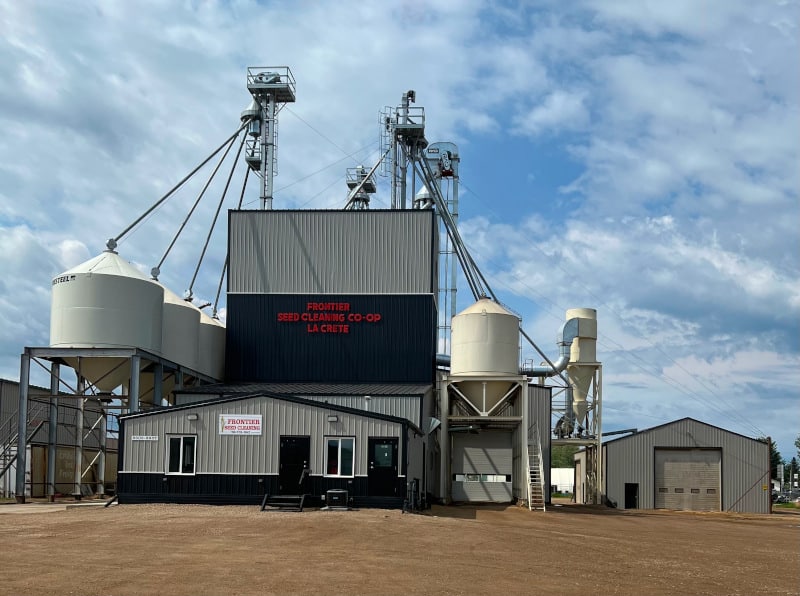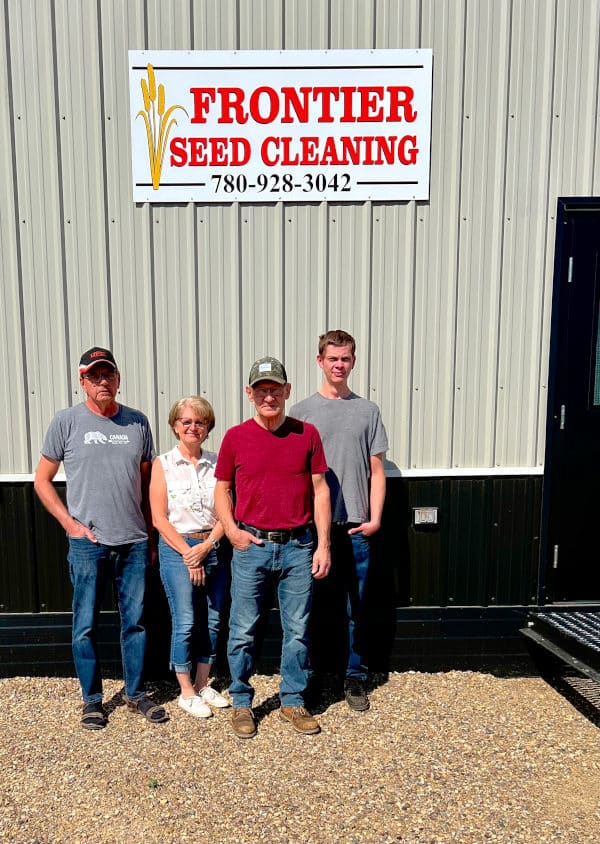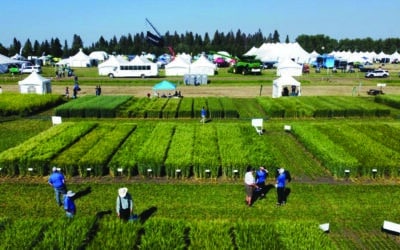PHOTO: The $2.8 million upgrade to the Frontier seed cleaning plant resulted in essentially building a new plant within the shell of the old one. The transformation included new tin siding and the installation of the latest technology, including a new colour sorter.
For one seed cleaning plant and its manager, COVID-19 forced a reevaluation of their expansion plans, leading to a remarkable transformation at their existing location.
Initially, Ken Wiebe’s plan was straightforward. In 2018, Frontier Seed Cleaning Co-op located in La Crete acquired new land outside of town with the intention of constructing a brand-new state-of-the-art plant.
However, when COVID-19 hit, the financial landscape shifted dramatically. Costs soared, making the original project seem like a distant dream as cost estimates ballooned.
“Our original budget for the new facility was between $7.5 million and $8.5 million. However, costs spiked to about $15 million. We knew we couldn’t handle that kind of debt. Instead of starting the project and risking bankruptcy before we even began, I pushed hard as a manager to rebuild our existing facility,” Wiebe recalls.
In June of 2023, after the busy season came to an end, Frontier Seed Cleaning Co-op started rebuilding at its present location. They sold the new land they had purchased nearby back in 2018 and reinvested in their current facility, undertaking an extensive renovation.
“We estimated that we could make it work with $2.5 million. We ended up spending about $2.8 million. The equipment is identical to what we had planned for the new facility, but the design of the plant is a bit different since we had to retrofit our old one.”
One downside is that Frontier still has only two acres in town compared to the 13 acres it would have had out of town with its original vision.
“But, we’ve worked with this location for 40 years, and I don’t see why we can’t continue for another 20 years at least,” Wiebe says.
The renovation was no small feat. The $2.8 million upgrade resulted in essentially building a new plant within the shell of the old one. The transformation included new tin siding and the installation of the latest technology, including a new colour sorter.
The result? A cutting-edge facility up and running in February of this year, just seven months after starting the renovation. In that short time, Frontier has processed 850,000 bushels, a testament to the facility’s increased capacity and efficiency.
“We’ve basically doubled our capacity,” Wiebe, detailing how they went from processing 350 bushels an hour to about 550 on wheat, and from 400 to 750 on oats.
Meeting Market Demands
This expansion was driven largely by a surge in the organic market.
“Despite some initial skepticism about the sustainability of the organic market, our investment in organic processing has really paid off,” Wiebe explains
Frontier now handles various crops with advanced technology, including a sophisticated colour sorter that eliminates impurities like wild oats and black peas, streamlining the cleaning process.
Frontier Seed Cleaning Co-op, first established in 1980, remains a cornerstone of the La Crete community, which is notable for its younger farmers.
“Our customer base is younger and younger,” Wiebe says. Many farmers he deals with are in their 20s and 30s, bringing fresh energy and ideas to the agricultural industry.
“We have a lot of intercropping going on here. Many of the organic farmers plant pea and oat together. We’re set up to separate the peas and oats, and then send the oats down the line. If needed, we can use the colour sorter to remove anything that shouldn’t be there. We can handle all sorts of additional processing for the oats as well.”
Previously, they had to separate the peas and oats, process the oats, and then clean them again. Now, they can do it all in one pass.
“This is really appealing for the farmers because the peas come out 99.9% clean right away. We can then deal with the oats and any necessary processing in a single step. We also separate the screenings, with oats on one side, peas on the other, and the waste processed differently.”
As the co-op’s members look to the future, Wiebe is optimistic. They have weathered the storm of COVID-19 and emerged stronger, with a modern facility that significantly enhances their capabilities. This resilience and adaptability will ensure they remain a vital part of the La Crete agricultural landscape for years to come, he says.
“We can process a load in three and a half hours now, compared to the five and a half to six hours it used to take. It’s a lot faster, but it also threw our scheduling out the window. We’ve had to completely relearn how to schedule everything to make sure it all still makes sense,” Wiebe adds.






